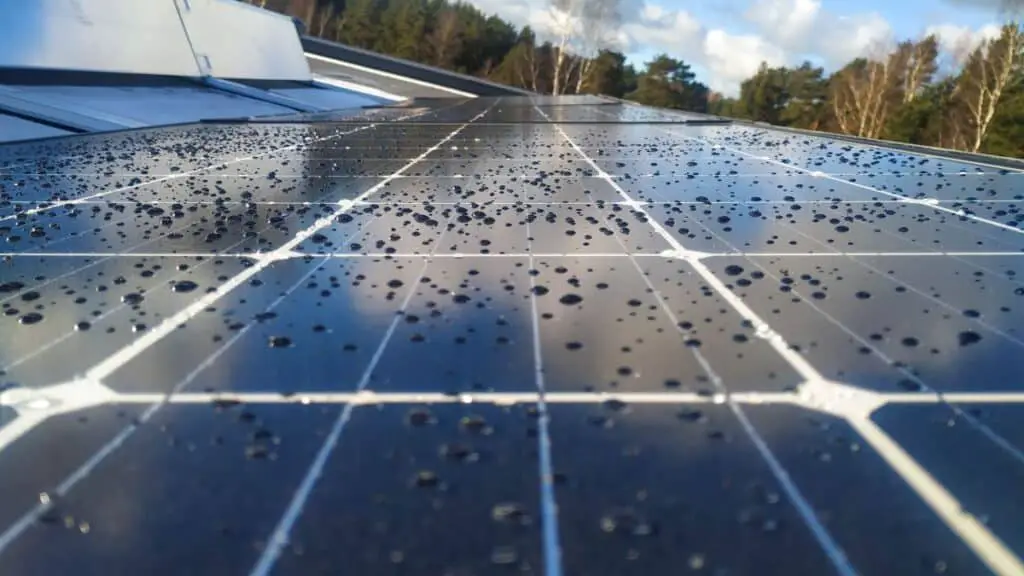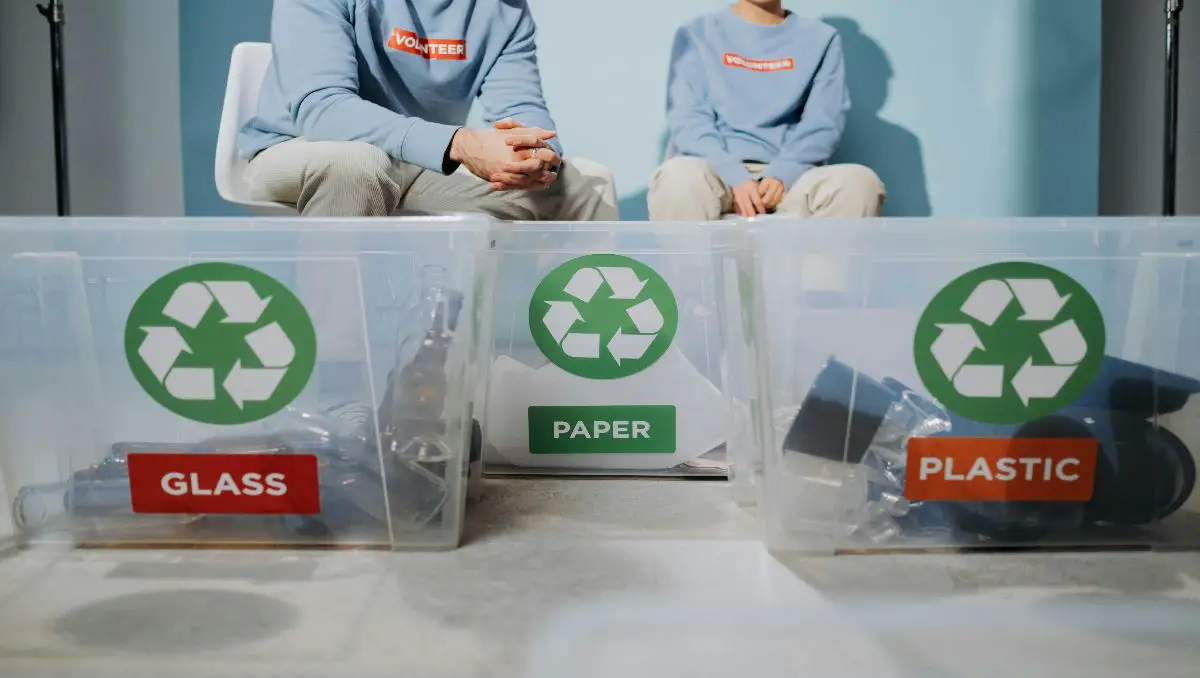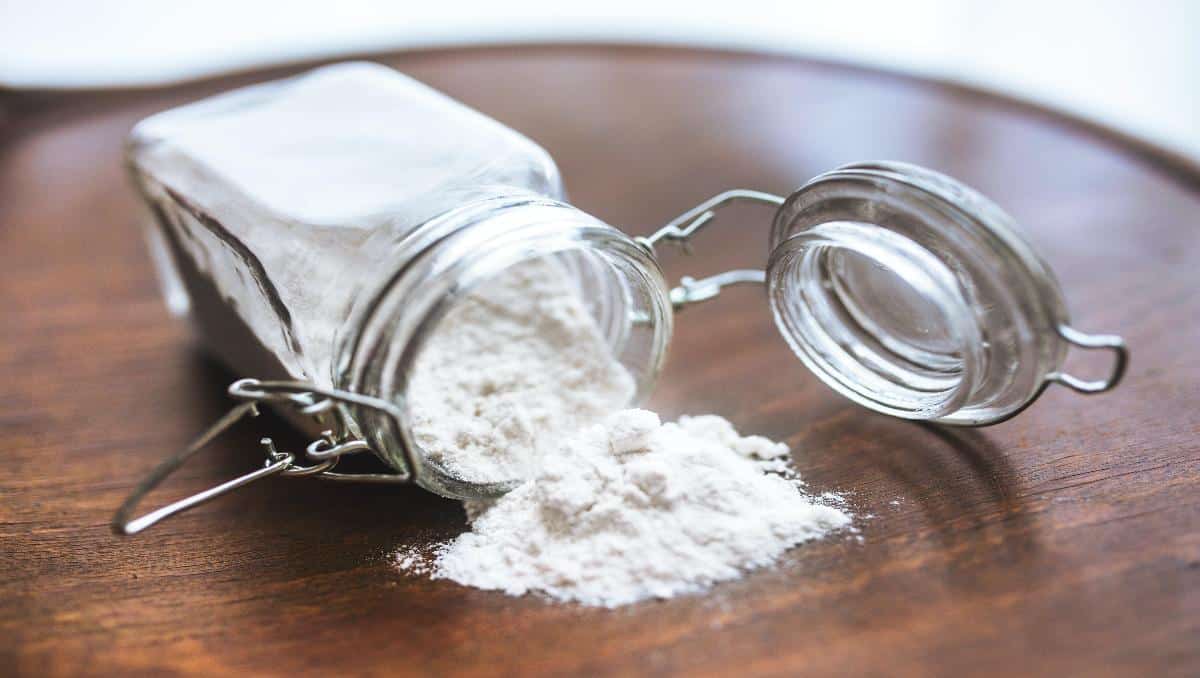Solar panels generate energy from the sun and turn it into electricity, but do they hold up against nature’s other elements, like water? Are all solar panels waterproof?
Solar panels are generally water-resistant, not waterproof. While they’re designed to withstand rain, snow, and moisture, it’s important to remember that being water-resistant differs from being completely waterproof.
Let’s find out more about the factors contributing to this difference and how to ensure your solar panels remain functional despite exposure to water.
Quick Navigation
- Understanding Solar Panels and Their Construction
- Water Resistance vs. Waterproof: What’s the Difference?
- Why Water Resistance Matters
- Factors Affecting Solar Panel Lifespan
- Protecting Your Solar Panel System
- So, Are Solar Panels Waterproof?
Understanding Solar Panels and Their Construction
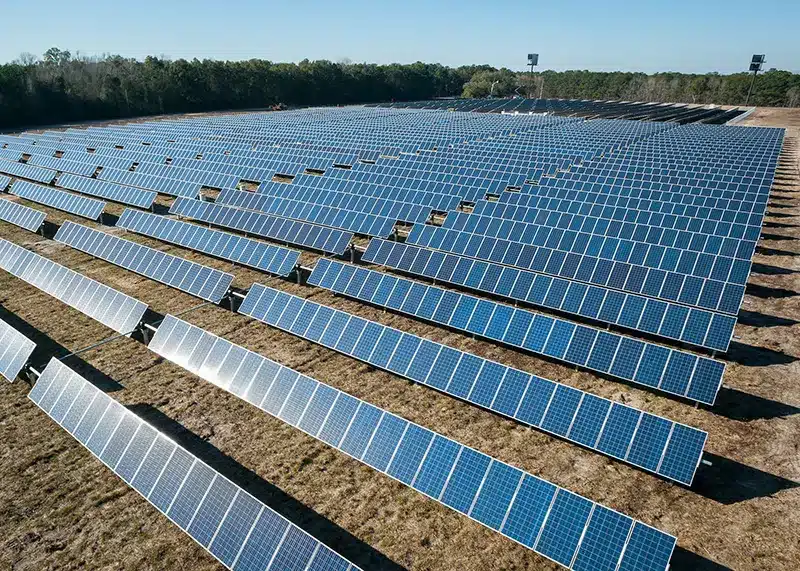
When we discuss solar panels, it’s crucial to know what we’re dealing with. Solar panels are devices that convert sunlight into electricity to power your home.
They comprise several individual solar cells made of semiconductor materials, like silicon, which generate electricity when exposed to light.
The Layers of a Solar Panel
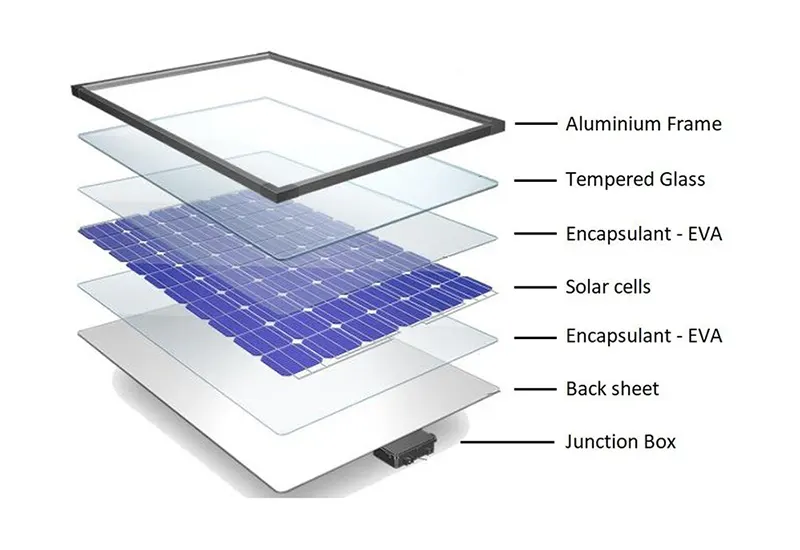
A typical solar panel consists of multiple layers. Each layer plays a unique role in protecting the panel and optimizing its performance. The main layers include:
Glass Layer
This is the topmost layer of the solar panel. Its primary function is to protect the solar cells underneath and let light from the sun pass through.
This layer is usually made from tempered glass, known for its durability and resistance to impact.
Solar Cells
Beneath the glass layer are the cells themselves. The magic happens in these individual cells as they convert sunlight into electricity.
Backsheet and Aluminum Frame
The backsheet is the last layer and offers additional protection to the solar cells. It’s usually made of a durable, waterproof material.
Surrounding the panel is the frame, typically made of aluminum, a material known for its resistance to rust and corrosion.
How Waterproof are Solar Panels?
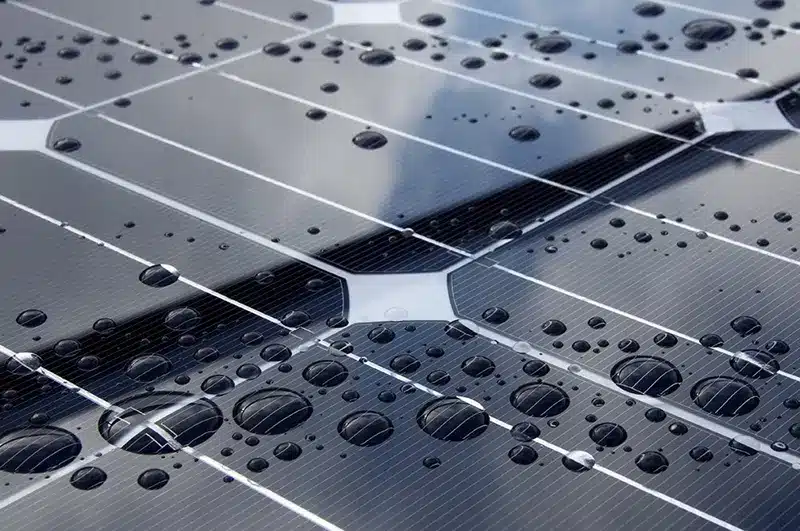
Most solar panels are built to be exposed to the elements, which means they must withstand various weather conditions, including rain and storm.
A panel manufacturer often uses materials and designs that help protect the panel from moisture intrusion.
Consider the junction box as an example. This box, where the electrical components reside, is usually designed to withstand water to prevent any damage to these crucial parts.
On most cases, home solar panels are waterproof and don’t suffer from water damages immediately. In the rare case that it affects yours, don’t worry.
An equipment warranty most likely has it covered. Solar companies often provide equipment warranties.
One of the critical factors that contribute to the water resistance of a solar panel is the architectural design of the panel itself. Many solar panels feature a slightly tilted design.
It allows for efficient water runoff in case of rain, minimizing the chances of water pooling on the surface.
This not only helps to prevent moisture intrusion but also aids in keeping the panels clean from dirt and debris.
Another aspect to consider is the protective layer that covers the cells. This layer, commonly made of tempered glass or durable plastic, is a barrier against water and other environmental hazards.
Solar companies choose these materials for their water-resistant properties and ability to maintain transparency for optimal sunlight absorption.
In addition, solar panels often have a sealed frame that encloses the edges, further preventing rain water from seeping into the panel.
Water Resistance vs. Waterproof: What’s the Difference?
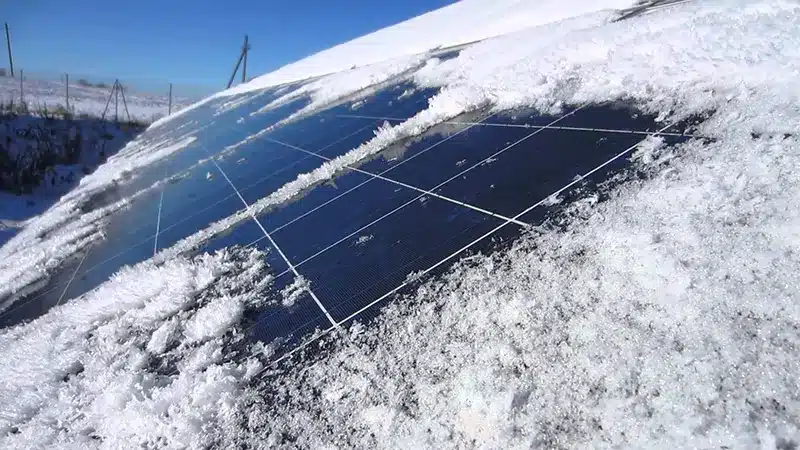
While most solar panel manufacturers market their products as ‘waterproof,’ it’s more accurate to describe them as ‘water-resistant.’ But what does this mean, and why does it matter?
Understanding Water Resistance
When a product is described as water-resistant, it can resist water penetration to some degree, but not entirely.
Solar panels can handle rain, snow, and maybe even a quick splash of water. However, it does not mean they can be submerged underwater without consequences.
Waterproof – A Misleading Term?
The term ‘waterproof ‘suggests that a product can be entirely submerged in water without damage. In the world of electronics, though, very few things are genuinely waterproof.
Instead, many devices, including solar panels, are designed to prevent damage from water under normal operating conditions, which does not typically include submersion.
Why Water Resistance Matters
Water resistance is critical for solar panels, as they’re often exposed to various weather conditions, including rain, storm, and humidity.
Understanding their level of water resistance can help you choose the right panels and preventive measures to protect your investment.
Panel Design
Solar panels consist of cells, a frame, and a protective layer, usually glass or plastic. This outer layer helps shield the cells from water and debris, but it’s not entirely waterproof.
Ingress Protection (IP) ratings indicate the level of water and dust resistance of a panel. A higher IP rating means better protection against water and dust.
Inverters and Wiring
The inverter, which converts the DC power generated by the panels into AC power for your home, is another component that needs protection from water.
While some inverters have higher water resistance, keeping them dry is crucial to ensure optimal performance and prevent electrical issues.
Wiring and connectors also play a role in maintaining water resistance. Using high-quality connectors and ensuring proper installation can help prevent damage from water and ensure the longevity of your solar energy systems.
Factors Affecting Solar Panel Lifespan
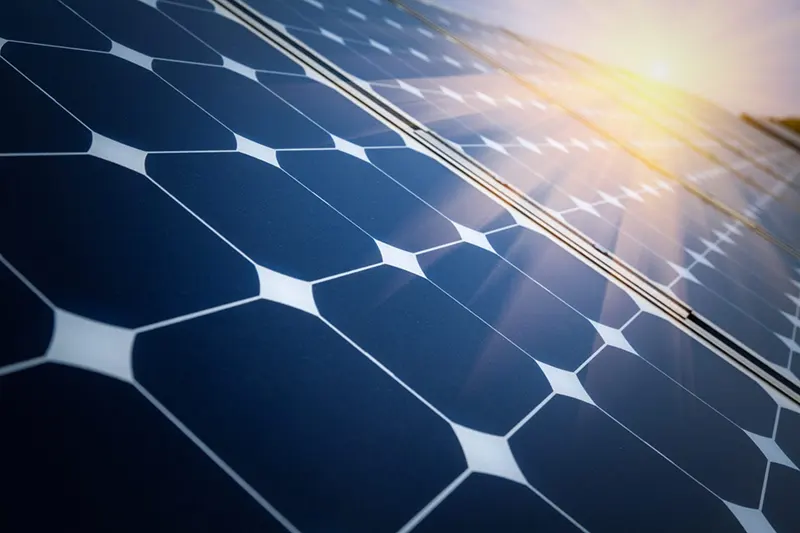
Aside from water resistance, other factors can impact the longevity of your solar panels.
Quality and Construction
Higher-quality panels are constructed using more durable materials, which can last longer and withstand harsher weather conditions better than cheaper alternatives.
High-quality solar panels often use top-grade cells, sturdy aluminum framing, and UV-resistant encapsulation materials that ensure optimal performance over time.
Investing in reputable solar panel manufacturers and certified products that meet stringent industry standards is essential to guarantee longevity and efficiency.
Climate and Weather
Extreme temperature fluctuations, such as rain, storm, hail, and heavy snowfall can all affect solar panel performance and lifespan. Choosing panels designed for your specific climate can help ensure their longevity.
For instance, solar panels built for colder climates often have increased snow load capacity, freeze-resistant framing, and temperature coefficient ratings that optimize performance in low temperatures.
Similarly, solar panels designed for hot climates may have better heat dissipation capabilities to maintain efficiency despite high ambient temperatures.
Moreover, it’s essential to be aware of local weather patterns and take preventive measures. If your area is prone to hailstorms, consider installing protective measures like hail guards.
In regions with high winds, ensure your solar panel mounting system is adequately secured and designed to withstand wind loads.
Cleaning and Maintenance
Dust, bird droppings, and other debris can accumulate on the surface of your solar panels, reducing their ability to absorb sunlight.
This can lead to decreased solar energy production and even cause hot spots, potentially damaging the solar cells over time.
Regular cleaning and maintenance can help prevent issues, such as dirt buildup and water damage, which can decrease the efficiency and lifespan of your panels.
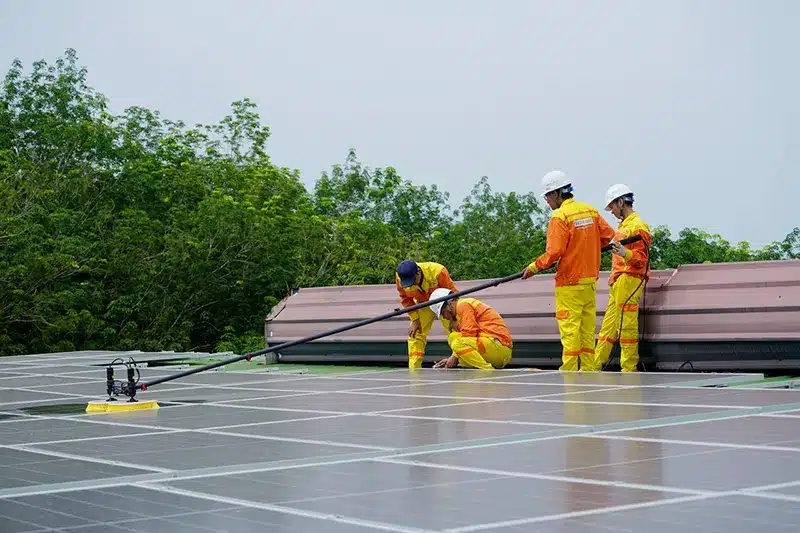
Establishing a cleaning and maintenance routine is crucial to maintain your solar panels’ longevity. Inspect and clean your panels at least once or twice a year, depending on environmental factors in your area.
You may need to clean them more frequently in particularly dusty or bird-populated environments. Use specialized cleaning tools and non-abrasive cleaners to prevent damage while cleaning.
Additionally, schedule regular professional inspections and maintenance to examine the entire solar system, including wiring, mounting hardware, and inverters, ensuring all components are in good working order.
Protecting Your Solar Panel System
While solar panels have some level of water resistance, it’s essential to take additional steps to protect them from water damage.
Proper Installation
Ensuring that your solar panels are installed correctly can go a long way in protecting them from damages.
This includes choosing an optimal location (like your roof, for example), using high-quality mounting hardware, and ensuring proper tilting for water runoff.
Avoid installing solar panels in low-lying areas susceptible to flooding or pooling water, as this can lead to water damages or compromise the structural integrity of the panels.
It’s also essential to work with experienced and certified installers who can recommend the best mounting techniques and hardware for your specific climate and roof type.
It ensures your panels are installed securely and can withstand various weather conditions.
Regular Inspection and Maintenance
Inspect your solar panels regularly to identify any possible issues, such as cracks or damaged seals, which could allow water to seep in.
Regular maintenance, such as cleaning and tightening fastenings, can also help prevent water damage.
Inspecting your solar panel system after extreme weather events is crucial to identify any potential damages and address them promptly.
In addition to routine visual inspections, consider using thermal imaging or electrical testing equipment to identify potential internal damage hidden from plain sight.
Additional Waterproofing Measures
While solar panels are designed to resist water, taking extra waterproofing measures can add an extra layer of protection. These protective measures help keep moisture out and ensure the electrical components remain dry and functional.
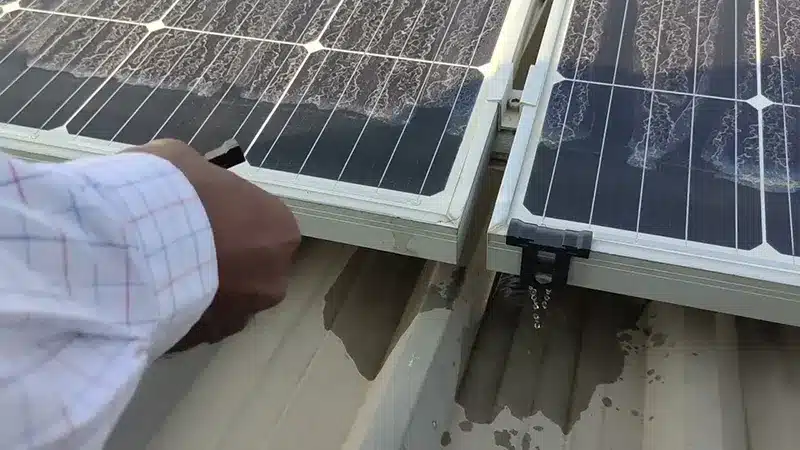
This can include using sealants around mounting points and junction boxes and investing in waterproof covers for your panels during extreme weather conditions.
Another option to consider is using solar panel edge clips or gutter systems that help direct water away from the panels themselves.
These systems can efficiently redirect water runoff, minimizing the risk of pulling water and potential moisture damage on the panel’s surface or edges.
So, Are Solar Panels Waterproof?
In summary, solar panels are generally water-resistant but only partially waterproof.
They’re designed to withstand hail and typical weather conditions, but taking additional preventive measures can help protect them from damages and prolong their lifespan.
By understanding the factors affecting water resistance and following the tips provided, you don’t have to worry about your solar panels being damaged and properly take care of them so they stay functional and efficient, even in adverse conditions.

